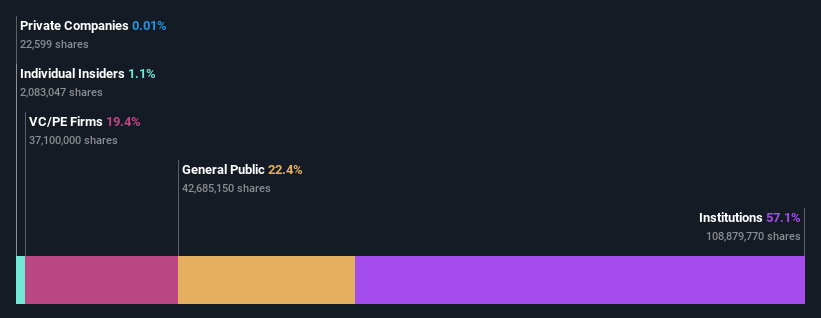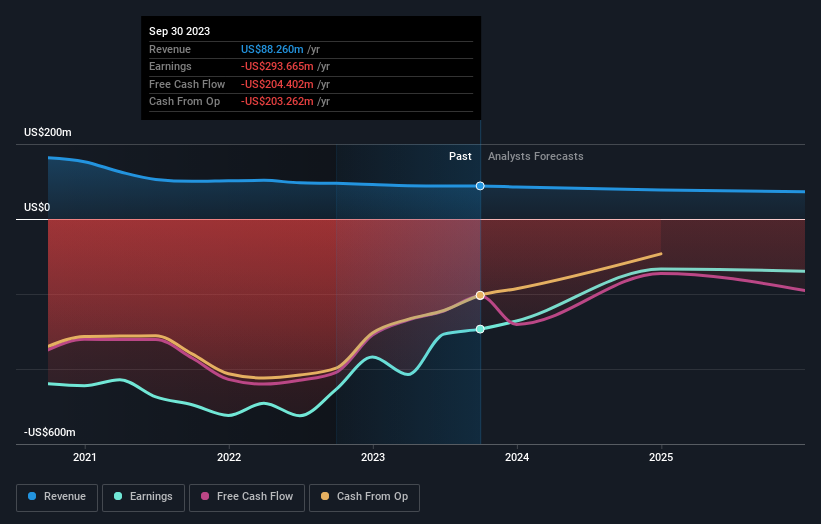Following a 75% decline over last year, recent gains may please Nektar Therapeutics (NASDAQ:NKTR) institutional owners
Key Insights
Given the large stake in the stock by institutions, Nektar Therapeutics' stock price might be vulnerable to their trading decisions
The top 11 shareholders own 51% of the company
If you want to know who really controls Nektar Therapeutics (NASDAQ:NKTR), then you'll have to look at the makeup of its share registry. We can see that institutions own the lion's share in the company with 57% ownership. Put another way, the group faces the maximum upside potential (or downside risk).
Institutional investors would appreciate the 11% increase in share price last week, given their one-year losses have totalled a disappointing 75%.
Let's take a closer look to see what the different types of shareholders can tell us about Nektar Therapeutics.
Check out our latest analysis for Nektar Therapeutics
What Does The Institutional Ownership Tell Us About Nektar Therapeutics?
Institutions typically measure themselves against a benchmark when reporting to their own investors, so they often become more enthusiastic about a stock once it's included in a major index. We would expect most companies to have some institutions on the register, especially if they are growing.
Nektar Therapeutics already has institutions on the share registry. Indeed, they own a respectable stake in the company. This implies the analysts working for those institutions have looked at the stock and they like it. But just like anyone else, they could be wrong. When multiple institutions own a stock, there's always a risk that they are in a 'crowded trade'. When such a trade goes wrong, multiple parties may compete to sell stock fast. This risk is higher in a company without a history of growth. You can see Nektar Therapeutics' historic earnings and revenue below, but keep in mind there's always more to the story.
Institutional investors own over 50% of the company, so together than can probably strongly influence board decisions. Nektar Therapeutics is not owned by hedge funds. Our data shows that RA Capital Management, L.P. is the largest shareholder with 9.8% of shares outstanding. For context, the second largest shareholder holds about 9.6% of the shares outstanding, followed by an ownership of 6.3% by the third-largest shareholder.
After doing some more digging, we found that the top 11 have the combined ownership of 51% in the company, suggesting that no single shareholder has significant control over the company.
While studying institutional ownership for a company can add value to your research, it is also a good practice to research analyst recommendations to get a deeper understand of a stock's expected performance. There are plenty of analysts covering the stock, so it might be worth seeing what they are forecasting, too.
Insider Ownership Of Nektar Therapeutics
The definition of an insider can differ slightly between different countries, but members of the board of directors always count. Company management run the business, but the CEO will answer to the board, even if he or she is a member of it.
Insider ownership is positive when it signals leadership are thinking like the true owners of the company. However, high insider ownership can also give immense power to a small group within the company. This can be negative in some circumstances.
We can see that insiders own shares in Nektar Therapeutics. As individuals, the insiders collectively own US$1.1m worth of the US$105m company. This shows at least some alignment, but we usually like to see larger insider holdings. You can click here to see if those insiders have been buying or selling.
General Public Ownership
The general public-- including retail investors -- own 22% stake in the company, and hence can't easily be ignored. This size of ownership, while considerable, may not be enough to change company policy if the decision is not in sync with other large shareholders.
Private Equity Ownership
With a stake of 19%, private equity firms could influence the Nektar Therapeutics board. Some might like this, because private equity are sometimes activists who hold management accountable. But other times, private equity is selling out, having taking the company public.
Next Steps:
It's always worth thinking about the different groups who own shares in a company. But to understand Nektar Therapeutics better, we need to consider many other factors. For example, we've discovered 2 warning signs for Nektar Therapeutics that you should be aware of before investing here.
If you would prefer discover what analysts are predicting in terms of future growth, do not miss this free report on analyst forecasts.
NB: Figures in this article are calculated using data from the last twelve months, which refer to the 12-month period ending on the last date of the month the financial statement is dated. This may not be consistent with full year annual report figures.
Have feedback on this article? Concerned about the content? Get in touch with us directly. Alternatively, email editorial-team (at) simplywallst.com.
This article by Simply Wall St is general in nature. We provide commentary based on historical data and analyst forecasts only using an unbiased methodology and our articles are not intended to be financial advice. It does not constitute a recommendation to buy or sell any stock, and does not take account of your objectives, or your financial situation. We aim to bring you long-term focused analysis driven by fundamental data. Note that our analysis may not factor in the latest price-sensitive company announcements or qualitative material. Simply Wall St has no position in any stocks mentioned.


